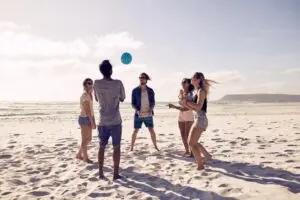7 Tips for A Successful Sober Vacation
 Traveling while in recovery can be intimidating, especially when going on vacation. While many may see vacation as a time to drink and often to excess, you need to maintain your sobriety for the sake of your mental and physical health. However, being sober doesn’t mean you can’t have fun. It just means you need to make better choices, approach your vacation more carefully, and choose your vacation friends or family with more care.
Traveling while in recovery can be intimidating, especially when going on vacation. While many may see vacation as a time to drink and often to excess, you need to maintain your sobriety for the sake of your mental and physical health. However, being sober doesn’t mean you can’t have fun. It just means you need to make better choices, approach your vacation more carefully, and choose your vacation friends or family with more care.
These 7 tips for a successful sober vacation will put you on the right track to having a great time without ever taking a drink.
1. Choose Your Location Carefully
Some destinations make it easy to stay sober, others do not. For example, if you were to choose a cruise or an island getaway, you’d quickly find yourself surrounded by alcohol and drunk people with little else to do to occupy your time. This does mean you will have to plan your activities around your sobriety. A camping expedition, sober cruise, or a city trip with visits to a museum is a much better idea than a destination that primarily requires laying on the beach.
However, a beach vacation can still be suitable for a sober vacation, providing you have self-control, can cope around alcohol, and know how to say no. For example, if you love surfing, you can go to the beach anyway, but expect many of the people there to heavily imbibe after sunset. What’s the bottom line? Try to avoid venues that are primarily catering to tourists and party-goers. Look for things to do and places to see instead.
As for a cruise, many cruise ships now have 12 step meetings on board, whether sober cruises or not. Be sure to check before you book.
2. Plan Your Time and Your Activities
Boredom on vacation is one of the easiest ways to slip up and drink. This is especially common when you find yourself romanticizing how much fun you used to have. If you don’t go prepared, you may end up at a hotel with nothing to do but drink, which will become more and more tempting the longer you stay. You’ll also likely be facing cravings, feeling like you should be having fun, and dealing with “why not just once” from your subconscious.
Planning your time helps you to avoid most or all these problems. For example, planning city trips, museums, walks or hikes, or sightseeing tours and occupying most of your time with things to do, food, or friends will help you to stay sober on vacation.
3. Be Mindful of the People You are With
If your friends and family are not supportive of you being sober or are not willing to remain sober around you, you will be tempted, likely offered a drink, and are much more likely to succumb. Choosing friends and family wisely when on a trip means considering their likely behavior, discussing your needs and mental health, and hopefully having a sober buddy you can talk to in case things go wrong.
Discuss Sobriety
Unless you’ve had a significant number of discussions about sobriety or your entire group is sober, you will have to discuss it. Explain that it is a problem, you cannot drink for your mental and physical health, and that alcoholism is a disease. You can normally cope, but this is a stressful situation in which your guard will be down. Having their support will greatly improve your vacation and help you to stay sober for the duration.
Discuss Activities
You won’t likely want to or enjoy going to a bar. If you think you’ll be okay with it, discuss it with your friends and family first. However, if the people you are going with intend to spend a large amount of time drinking, you should reconsider going with them. They can go out and drink, providing you have other opportunities to entertain yourself in a way that won’t make you feel lonely or left out.
4. Visit Group Support at Your Destination
 Most areas will have a support group or AA branch on location. You can research options on the AA website before you go, contact them in advance, and attend either a meeting or guest meeting while there. Most AA groups will be very supportive of guest members.
Most areas will have a support group or AA branch on location. You can research options on the AA website before you go, contact them in advance, and attend either a meeting or guest meeting while there. Most AA groups will be very supportive of guest members.
Why should you go? Many people feel as though they lose accountability on vacation, which does lead to a higher rate of relapse. Taking 30-60 minutes a day to attend group meetings will give you that accountability and will help you to stay sober. If you’ve introduced yourself as on vacation and trying to stay sober, going back every night still sober will be an accomplishment. While attending AA can be an inconvenience, especially when you want to have fun, it is an effective way to improve social motivation and stay sober.
5. Stay Active and Eat Healthy
Most people naturally go on vacation and binge on unhealthy food, get no exercise, and fail to take care of themselves. You shouldn’t. Taking the time to eat at least one healthy meal every day, exercising, and taking care of yourself is an important part of maintaining your sobriety.
Exercise
Try a minimum of 30 minutes of exercise per day. You can hit the local gym, go for a walk on the beach, go swimming, do yoga, or try out athletic activities such as skiing, surfing, or horseback riding. The most important thing is that you exercise to release stress and decrease addictive cravings. It also keeps your body in good shape, and the release of endorphins through exercise just makes you feel better in general as well.
Food
It’s important to eat a nutritionally balanced meal. Vitamin deficiencies or even a sugar crash can cause a dramatic drop in mood, making you much more susceptible to relapse. Don’t let yourself get too hungry and don’t indulge too much in foods you love. Look for balance. Normally, starting out with a healthy breakfast and having a healthy lunch are a great way to go.
6. Don’t Overdo It, Manage Your Stress
If you’re going to a destination with a lot of things to do, it can be easy to overwhelm yourself, get stressed, and relapse. Stress is a large contributor to relapse, simply because it’s one of the biggest contributors to addiction in the first place. Make sure you pace yourself, plan to have fun but not to do too much and take breaks to de-stress.
Most people find that participating in mindfulness or a similar activity, exercising, and taking breaks will reduce stress a great deal. Another consideration is that you should take steps to spend your time with people who aren’t stressful and who won’t demand too much of you, recognize when you’re tired or are doing too much, and step back and have fun. Don’t be afraid to change your plans last minute and go for a nap if you’re feeling overwhelmed.
7. Plan How to React If Someone Offers You Alcohol
Most vacation destinations are at least slightly dedicated to drinking. The more you go out at night, the more it will be unavoidable. While you can plan quiet evenings in your hotel or hostel with others, alcohol may still come up. It’s important that you plan and practice how to say no. Most of the time, a simple, “No thank you”, will do. If the person doesn’t accept, you can follow up with excuses like “I’m driving”, “I can’t”, or even, “I’m allergic”, if you don’t want to disclose that you’re in recovery to a stranger. However, honesty is often a great policy, unless the stranger is not supportive.
Sober vacations are often a lot more fun than you might think, especially if you’re newly in recovery. Plan things you like to do, bring people who are fun to be around sober (if you travel with others), and take steps to make your vacation enjoyable. You’ll quickly find that you can have every bit as much or more fun without alcohol or drugs.
Have fun on your sober vacation!
Beginnings Treatment Centers is located in beautiful and sunny Southern California in Orange County, which has one of the strongest and most active recovery communities in the United States. If you or your loved one is struggling with addiction, contact us today and speak with one of our experienced and professional intake advisors, we’re here to help.

